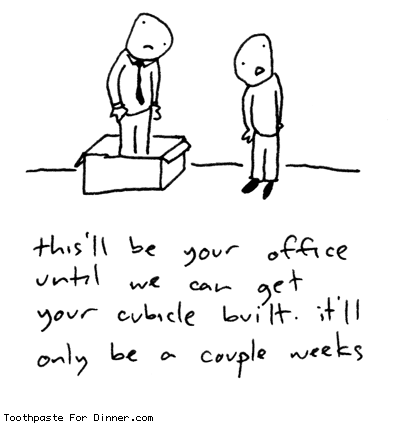No one warned me that, in the course of my training in psychology, I would develop a Therapist Clock.
I learned early on how to check my watch as subtly as possible (the "itchy wrist" is always a good technique), where to place the furniture for maximum clock visibility (you need at least two clocks, one across from each chair), and how to structure the last 10 minutes of the session in order to segue smoothly into "We need to wrap up for today" at 3 minutes before the end.
But I never learned about the Therapist Clock until it was too late.
The Therapist Clock is an internal timekeeping device that divides up one's waking experiences into 50-minute chunks. The Therapist Clock also contains subdivisions, at 10, 15, 25, and 35 minutes. The Therapist Clock is capable of running longer than 50 minutes, but it is not always accurate in its second cycle (indeed, it is frequently 10 minutes behind).
The Therapist Clock cannot be shut off, and it does not care what you are doing. The Therapist Clock is useful in many situations, such as waiting for the bus, making pasta, or gauging how much longer the washing machine will be running. The Therapist Clock is also frighteningly good at predicting plot twists during Law & Order, which, for the curious, generally fall at or around :15, :38, and :50.
But the Therapist Clock is very much a handicap with respect to other activities, such as sitting through a slow movie, talking on the phone ("hey, it's so good to hear your voice, but our time's up for today"), or *ahem* intimate relations.
The Therapist Clock frequently malfunctions on airplanes, but not on trains, buses, or cars. It never malfunctions in the waiting room at the doctor's, nor in the emergency room (provided, of course, that one is fully conscious). The Therapist Clock also never malfunctions during one's own therapy. I find it absolutely hilarious when both of us start to fidget after 45 minutes.
Yesterday morning I went to Target, in search of some random items. I entered the store at about 10:10. When I left the store, I estimated I'd been shopping for about forty minutes. I'd forgotten my watch--I knew what time I'd gone in from the car radio--so to check my estimate, I pulled out my trusty cell phone (which, for the curious, has a bitchin' Law & Order ringtone).
And lo! It was 10:47.
Quite pleased with myself, I called Mrs. Gerbil to brag.
"You scare me," she said.
I think I've been working on this post for about 50 minutes now... oho! Indeed I have. Well, we need to wrap up for today. See you next time. Bye bye, take care.






 As you can imagine, I get very tired of saying the same thing over and over and over again. I probably say "I can't see any information about your claims" in my sleep. Sometimes I feel like I'm David Spade in that one commercial, except I'm not saying "NOOOOooooo!" for the passive-aggressive hell of it.
As you can imagine, I get very tired of saying the same thing over and over and over again. I probably say "I can't see any information about your claims" in my sleep. Sometimes I feel like I'm David Spade in that one commercial, except I'm not saying "NOOOOooooo!" for the passive-aggressive hell of it. Since late February I have been working the swing shift (including weekends) in the call center of a humongous behavioral health insurance company. Mostly I'm quoting benefits, issuing authorizations, and pre-certifying inpatient stays. But occasionally I get crisis calls, which are always interesting.
Since late February I have been working the swing shift (including weekends) in the call center of a humongous behavioral health insurance company. Mostly I'm quoting benefits, issuing authorizations, and pre-certifying inpatient stays. But occasionally I get crisis calls, which are always interesting. The mute button is the best way to put callers on hold without actually putting them on hold. It's weird and uncomfortable to be on the phone with a stranger while neither of you is saying anything, right? and it's so much better to be on hold, right?
The mute button is the best way to put callers on hold without actually putting them on hold. It's weird and uncomfortable to be on the phone with a stranger while neither of you is saying anything, right? and it's so much better to be on hold, right?
 No sooner did I pull out my phone and dial her than one of the secretaries barked, "YOUNG LADY!"
No sooner did I pull out my phone and dial her than one of the secretaries barked, "YOUNG LADY!" "I'm so not offended!" I said. "But anyway, I was in the class of 1997."
"I'm so not offended!" I said. "But anyway, I was in the class of 1997."


